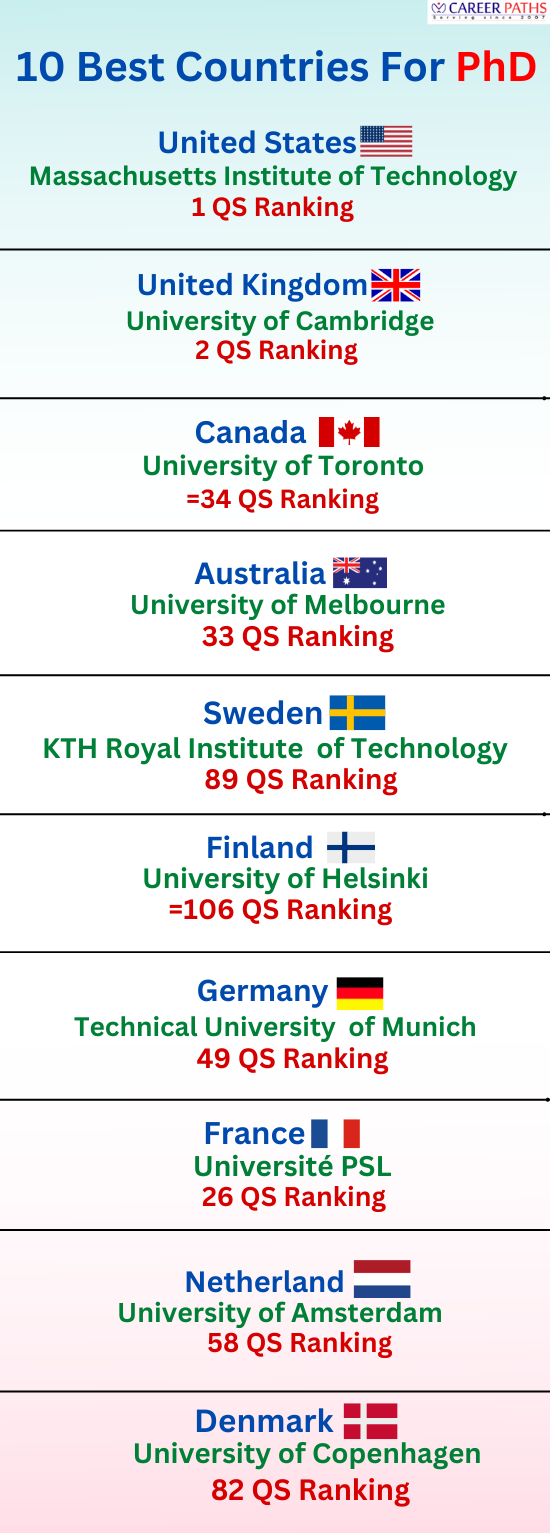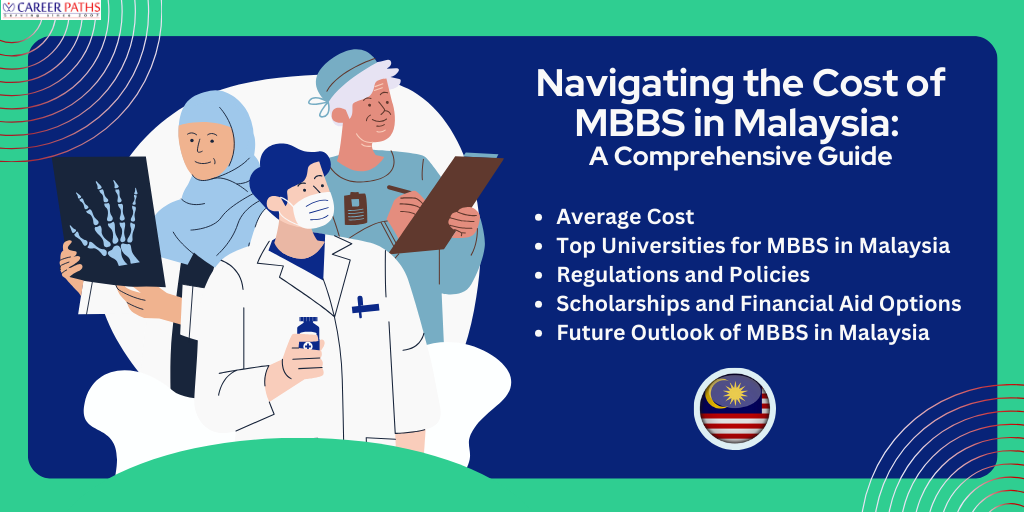Are you worried about pursuing a PhD degree and looking for a complete step-by-step guide but you don’t know whether it is for you or not? Then this article is only for you. You will get to know what are the good things to become a PhD student.
Becoming a PhD student is not as easy as in other programmes. It is regarded as one of the most prestigious degrees as it is the top level of the academic system in the world. Hence, the application process is also lengthier but it is not impossible for you if you go through our in-depth details and step-by-step guidelines. Let us help you to explore the idea of doing a PhD.
What is a PhD Degree?
A PhD degree is also known as a doctorate degree. It is the highest academic level that a student can achieve.
PhD, a Latin term (Ph)ilosophiae and (D)octor, is the shorter version of Doctor of Philosophy which is also written as DPhil. If you earn the PhD degree then you will be entitled to use the title, Doctor. As it is the highest level of education, the path is not as easy as other degrees. A simple way to describe the PhD degree is when you get your associate’s degree, you know a little bit about a subject. When you get your Bachelo’s degree, you are pretty well versed in a subject, and you know a lot about it.
When you get the Master’s degree, you are like an expert and you are a master in that subject. Lastly, when you get the PhD degree, you know so much about a certain subject that you can move the entire field forward and discover completely new things as you have a high level of understanding of the subject that instead of reading the books, you can write the books yourself.
PhD is discovering something new that resonated with you as an individual. Moreover, it is discovering something new in an area of research and an idea of advancing knowledge. A PhD degree develops every human being academically, in writing skills, analysis skills, communication skills, and many more.
You might be surprised to hear that a PhD degree is not just about all the intellectual skills that you are going to develop, there are a lot of other skills that you really learn

Types of PhD
There are so many factors related to the PhD degree such as coursework, research, exploration, evaluation, and so on. Hence, there are different ways to do PhD degree through which you can achieve this prestigious degree. They are- Thesis-based PhD, Publication-based PhD, Professional Doctorate, Integrated PhD, and Distance PhD. Besides, there are only two types of PhD degrees. They are-
- Academic
- Professional
Below we are naming some of the top PhD Qualifications that are famous around the world. It is to be noted that we haven’t covered all the qualifications as there are so many available degrees.
| PhD Qualification | Full Title of the PhD degree | Subjects | Duration | Types |
|---|---|---|---|---|
| PhD / DPhil | Doctor of Philosophy | All | Minimum 4 to 7 years. Maximum 8 to 10 years. | Academic |
| EdD / D.Ed | Doctor of Education | Education | Minimum 3 years. Maximum 8 years | Professional |
| DSocSci | Doctor of Social Science | Social Sciences | Minimum 4 years | Professional |
| EngD / PhD (Eng) | Doctor of Engineering | Engineering | 3 – 5 years | Professional |
| DBA | Doctor of Business Administration | Business | Minimum 4 years. Maximum 6/7 years | Professional |
| DProf | Doctor of Professional Studies | All | 4 – 5 years | Professional |
| DArch | Doctor of Architecture | Architecture | Minimum 3 years | Professional |
| MD | Doctor of Medicine | Medicine and Health Sciences | Maximum 6 years | Professional |

Requirements to do PhD
As PhD is the highest level and rich academic degree so its requirements are also long and unique. It is not that anyone from any background can do PhD degree. There are many terms and conditions inherent in doing PhD. There are multiple terms and conditions. Moreover, every year the eligibility, rule and teams, and conditions of obtaining a PhD change. According to the PhD application guide 2023, among other requirements, let us explore the basic requirements to apply for a PhD degree.
- Master’s degree: It is a mandatory prior step to apply for Phd degree. However, in some countries, you can apply for PhD after finishing your bachelor’s. In this case, there will be implied some other terms and conditions.
- Research proposal: A research proposal is
In most of the PhD programmes in the world, the Research proposal is 1000 – 4000 words, however, the word limit varies from university to university. Not every university requires a research proposal. - English proficiency: If you are willing to do PhD in any other language except your mother tongue then you must go through a language test. If it is English then IELTS or TOFEL would help you. In most of the PhD programmes in the world IELTS minimum of 6.5 in an overall band is required however, the score varies from university to university.
- Statement of Purpose.
- Curriculum vita.
- Copy of a valid passport.
- Copies of academic certificates, transcripts, and reference letters.
Age Factor
here is no age limit to doing PhD in all over the world. But if you are looking for fellowship then there will age limitation based on streams. You can do it at any age of your life when all the requirements of doing a PhD are met. But it is to be calculated and realized whether doing a PhD at that age is fruitful for you or not. There are various factors like, can you complete the PhD degree at that specific age, or can it bring positivity to your life, and so on.
Steps of Becoming a PhD Holder

The steps to do a PhD degree are very lengthy and challenging. You have to go through mandatory processes. It is to be noted that PhD’s steps are varied from country to country and university to university. Hence, some of the main processes are emphasized below-
- Shortlist your preferable Country
- Shortlist your preferable University
- Filling up the application forms
- Entrance interview exam (Questions will be asked on research methodology, statistics, and so on)
- Main Interview.
Course Work. (Depends on full-time and part-time PhD) - Topic building. (Help of experts and supervisor or supervisors)
- Data collecting (Getting on the field)
- Data analyzing.
- Formally start writing the thesis without any sort of plagiarism.
- Publication and presentation of at least two papers, according to University Grants Commission (UGC) norms and guidelines. These two papers should be from your researched thesis topic. You have to take out an extract paper of your thesis that you are working on by changing the variables, modifying, and so on.
- Upon writing your thesis, you have to apply for your pre-Phd by applying to the university stating that you are done with your researching and writing thesis and now you want to present your work to the authorities and concerned people.
- Attending the Pre-PhD seminar for suggestions and editing.
- Submitting your long abstract.
- You have to publish, binding, corrected, signed by all related authorities within the tenure duration given by the university.
- Approval by experts for the analysis, reading, and assessment.
- Oral defense of your thesis. When you are satisfied with your answers they awarded you with the “PhD Degree.”
World’s Top Universities for PhD Degree
|
University Names |
Location
|
QS Ranking |
THE Ranking
|
|---|---|---|---|
|
Massachusetts Institute of Technology |
United States | 1 | 5 |
| Stanford University | United States | 3 | 3 |
| University of Cambridge | United Kingdom | 2 | 3 |
| University of Oxford | United Kingdom | 4 | 1 |
| Harvard University | United Kingdom | 5 | 2 |
| ETH Zurich | Switzerland | 9 | 11 |
| Tsinghua University | China | 14 | 16 |
| Peking University | China | 12 | 17 |
| National University of Singapore | Singapore | 11 | 19 |
| University of Toronto | Canada | 34 | 18 |
| McGill University | Canada | 31 | 46 |
| University of British Columbia | Canada | 47 | 40 |
| The University of Hong Kong | Hong Kong | 21 | 31 |
| The University of Tokyo | Japan | 23 | 39 |
| Université PSL | France | 26 | 47 |
| Australian National University (ANU) | Australia | 30 | 62 |
| The University of Melbourne | Australia | 33 | 34 |
| Technical University of Munich | Germany | 49 | 30 |
Benefits of doing a PhD Degree
When you are deciding whether you should do PhD or not, the first thing you should as yourself is what are the benefits of doing it and how it is going to improve your life better.
A PhD degree will help you to become an academic person, lecturer, professor, or researcher. Amongst the so many advantages, some of the benefits of doing PhD are-
- One of the biggest benefits of doing a PhD is that it allows you to establish an academic identity. Working in academia is not like working in any other sector because it is unique in the sense that you do have the requirement to do publications, and research and you will have your specialism.
- The networking opportunities are fabulous. You attend conferences, work with the supervisors, your fellow PhDs, and many more. There is a big circle in the PhD world.
- It is a pivotal point in your academic career in terms of the establishment. It will allow opportunities to apply for jobs that you may be qualified before.
- One of the best benefits of doing a PhD degree is that it demonstrates skills and qualities beyond writing a Thesis. Additionally, it demonstrates the levels of determination of motivation.

Duration of a PhD Degree
Firstly, if you doing your PhD, you are going to be doing a lot of hands-on work. There are different types of PhD degrees available in different universities around the world. Mainly, the timing of a PhD degree is depended on the programme design, your subject area, your research, and so on. The mainstream PhD degree at most universities is finished in between 4 to 7 years. However, it is dependent on various factors which may lead you to finish your PhD degree in 8 to ten long years.
Expenses Related to a PhD Degree
After reading all the positive sides about PhD now do you want to know how much should a PhD costs? The simplistic answer is nothing. It should cost you zero dollars. In most cases, students do not understand from where their funding is coming. It is highly variable by discipline. Institution, department, and sometimes even who your PhD advisor is.
Stipend
Most PhD programmes are fully funded which means you do not need to pay anything directly for your PhD. This means that not only you are paying for your tuition fee but also getting a stipend for your living expenses. Are you thinking about from where the fund comes? Who will be doing it? A large percentage of the time it is not just the department or the university paying for you to be a PhD student.
There are few common funding sources. Firstly, you teach, either as a teaching assistant or sometimes eventually teaching your class as an instructor. It means that when you get a stipend, it is essentially your salary for teaching undergraduate-level students
This is a very common mode in most of the universities in the world for PhD students. Your funding is a combination of both teaching assistantships and research assistantships. The second funding source can be research grants. If you choose to research then this means your stipend is essentially your salary for being a research or particular funded project.
It is to be noted that the amount of stipend varied from institution to institution or often by individual programme or department.
Research Assistant Funding
In PhD, there is a very important thing about research assistant funding that not all students know and realize. Most of the time, individual faculty members apply for grant funding for specific research projects that their PhD advisees will carry out. Moreover, most PhDs are funded as a combination of teaching assistantships and research assistantships. This means that some of the funding comes from the department or the university and some of it comes from individual faculty members’ grant funding.
There is another fund which is known as Fund for benefit. It is basically the health insurance fund provided by the universities.
Fellowship
Fellowship is another funding criteria of PhD degree. There are two types of fellowships; one is internal and another one is external. Fellowship is basically the university will pay for you to be a PhD student. Sometimes it is tied to a particular research project, some departments also have funds available for all of their PhD students or sometimes they have competitive fellowships, or sometimes there are also university-level fellowships that are often applied by the department.
There are also a number of external fellowships. It is to be noticed that this external fellowship is extremely competitive. Additionally, there is a range of possibilities that aren’t common that much. For example, in some nations, the governments pay for someone to get a PhD abroad or sometimes some companies pay for an employee to get the PhD. There are also other potential costs and other potential benefits. For example, a lot of universities have fees that you will have to pay. As a PhD student, sometimes, you may have the funds available for things like conference travel or research expenses.
All of the above mentioned information is subject to change at any time based on different countries’ university rules and regulations.
FAQs
Is there any age limitation for doing PhD?
According to different countries’ laws, there is no age limitation to earn a PhD degree.
Is funding guaranteed in PhD?
In most cases, the funding guarantee is for four years. However, it varies from institute to institute.
Which country is best for a PhD degree?
USA, UK, Germany, and Canada are on the top to earn a doctoral degree.
Can a PhD holder be called a Doctor?
PhD means a Doctor of Philosophy. If you do a PhD you will be entitled to Doctor.
How long is a PhD degree?
As it is the highest level of education, it needs more time and hard work to finish. Usually, a PhD degree ends between three and four years. However, in some exceptions, it may take 7 to 10 long years too.
Do PhD students get paid?
Generally, the answer will be yes. Most universities offer some sort of funding in return for PhD students. Moreover, It depends on the countries, departments, and universities.
What is the ideal age for doing PhD?
The ideal age for PhD degree is 30 but there are also numerous PhD holders who are more than 30 years old and earn a PhD degree.
Conclusion
Education is one of the blessings of life and it is a necessity. You have to be passionate about uncovering new knowledge. PhD is a journey where students try to uncover something new with high-end research skills.
It is to be expected that the article has answered all your queries about becoming a PhD student in the detailed guideline. I hope all the steps, types, duration, and funding details to become a PhD student is clear to you now. You can also explore our article on “Best University for Ph.D. programs in Malaysia – Career Paths.” For any queries, comment below.











